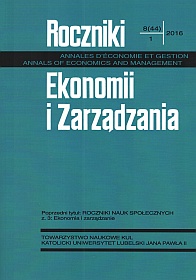Interim Management – a New Trend in Employment of Managers in the Enterprises
Abstract
The concept of interim management (IM) is still relatively little known in Poland. However, it can become widespread and highly regarded solution in the Polish enterprises as a result of striving to increase labour mobility and flexibility of employment forms in the European Union.
The aim of the paper is the analysis of the possibilities of implementing the concept of interim management as a flexible form of employment in the modern enterprise. At the outset, the essence and genesis of the concept of interim management has been presented. In the following part, the labour market for interim managers in Europe and Poland has been characterized. The comparison of this form of flexible employment and other forms used in Polish companies has been conducted. In the final part of the article, the key benefits and risks of implementation the concept of IM for the company as well as for interim managers have been identified.
References
Ballinger G. A., Marcel J. J.: The use of an interim CEO during succession episodes and firm performance, “Strategic Management Journal” 31 (2010), No. 3, pp. 262-283.
Birasnav M., Rangnekar S., Dalpati A.: Transformational leadership, interim leadership, and employee human capital benefits: an empirical study, “Procedia Social and Behavioral Sciences” 2010, No. 5, pp. 1037-1042.
Bloemer V.: Interim Management: Top-Kräfte auf Zeit, Berlin –Regensburg 2003.
Browning B. W., McNamee L. G.: Considering the temporary leader in temporary work arrangements: sensemaking processes of internal interim leaders, “Human Relations” 65 (2012), No. 6, pp. 729-752.
Bruns J.: Interim Management Deployments in the Innovation Context, Mering: Hampp Rainer Verlag 2006.
Bruns J., Kabst R.: Interim Management: A paradox for leadership research?, “Management Revue” 16 (2005), No. 4, pp. 512-524.
Buchajska-Wróbel M., Wendt R., Rytka E., Gasparski J., Gajda K.: Menedżer do zadań specjalnych. Czasowe zarządzanie przedsiębiorstwem, Gliwice: Helion 2011.
Clutterbuck D., Dearlove D.: The Interim Manager: A New Career Model for the Experienced Manager, London: Financial Times Pitman Publishing 1999.
European Commission, Towards Common Principles of Flexicurity. More and better jobs through flexibility and security, Brussels, COM 359 (2007).
Executives Online Group, Euro Interim Management Report 2014, http://www.exec-utivesonline.co.uk/en/about-us/our-credentials/reports.pdf [dostęp: 15.03.2016].
Greiner L.E., Poulfelt F.: The Contemporary Consultant, Mason (Ohio) 2005.
HResearch, Badanie stanu IM w Polsce 2010, http://www.stowarzyszenieim.org/page/logowanie.pdf [dostęp: 15.03.2016].
Institute of Interim management, Interim Management Survey 2013, http://ww w.iim.org.uk.pdf [dostęp: 15.03.2016].
Isidor R., Schwens C., Kabst R.: Interim Management Utilization, Firm Flexibility and its Impact on Firm Performance, “International Journal of Human Resources Development and Management” 14(4) (2014), pp. 171-186.
Konfederacja Lewiatan, Diversity Index. Przewodnik po zarządzaniu różnorodnością, Warszawa: Lewiatan 2013.
Loranc R.: Istota usług interim management, “Economics and Management” 2015, nr 1, s. 73-84.
Lewicki P.: Polityka rynku pracy na tle zjawisk migracyjnych zasobów pracy, w: Człowiek i organizacja XXI wieku, red. W. Harasim, Warszawa: Wyższa Szkoła Promocji 2013, s. 161-176.
Lovegrove H.: Making a Difference: The Pragmatic Approach of an Interim Manager, Lannoo Uitgeverij 2007.
Mądra E., Niesiobędzka-Rogatko K., Sobiecki G., Wendt R.: Metodyka interim management, Warszawa: Stowarzyszenie Interim Managers 2014.
McGovern M., Russell D.: A New Brand of Expertise: How Independent Consultants and Free Agents Are Transforming The World of Work, Woburn (MA): Butterworth–Heinemann 2001.
Rybnikova I.: Interim Management. Analyse einer atypischen Beschäftigungsform für Führungskräfte, Wiesbaden: Gabler Verlag Springer Fachmedien 2011.
Stowarzyszenie Interim Managers, Badanie stanu IM w Polsce, 2011, http://www.stowarzyszenieim.org/page/logowanie.pdf [dostęp: 15.03.2016].
Storey J., Quintas P., Taylor P. Fowle W.: Flexible employment contracts and their implications for product and process innovation, “The International Journal of Human Resource Management” 13 (2002), pp. 1-18.
Wendt R.: Interim management. Nowoczesne rozwiązanie ułatwiające pracę HR, „Personel Plus” 2015, nr 3, s. 67-71.
Copyright (c) 2016 Roczniki Ekonomii i Zarządzania

This work is licensed under a Creative Commons Attribution-NonCommercial-NoDerivatives 4.0 International License.


